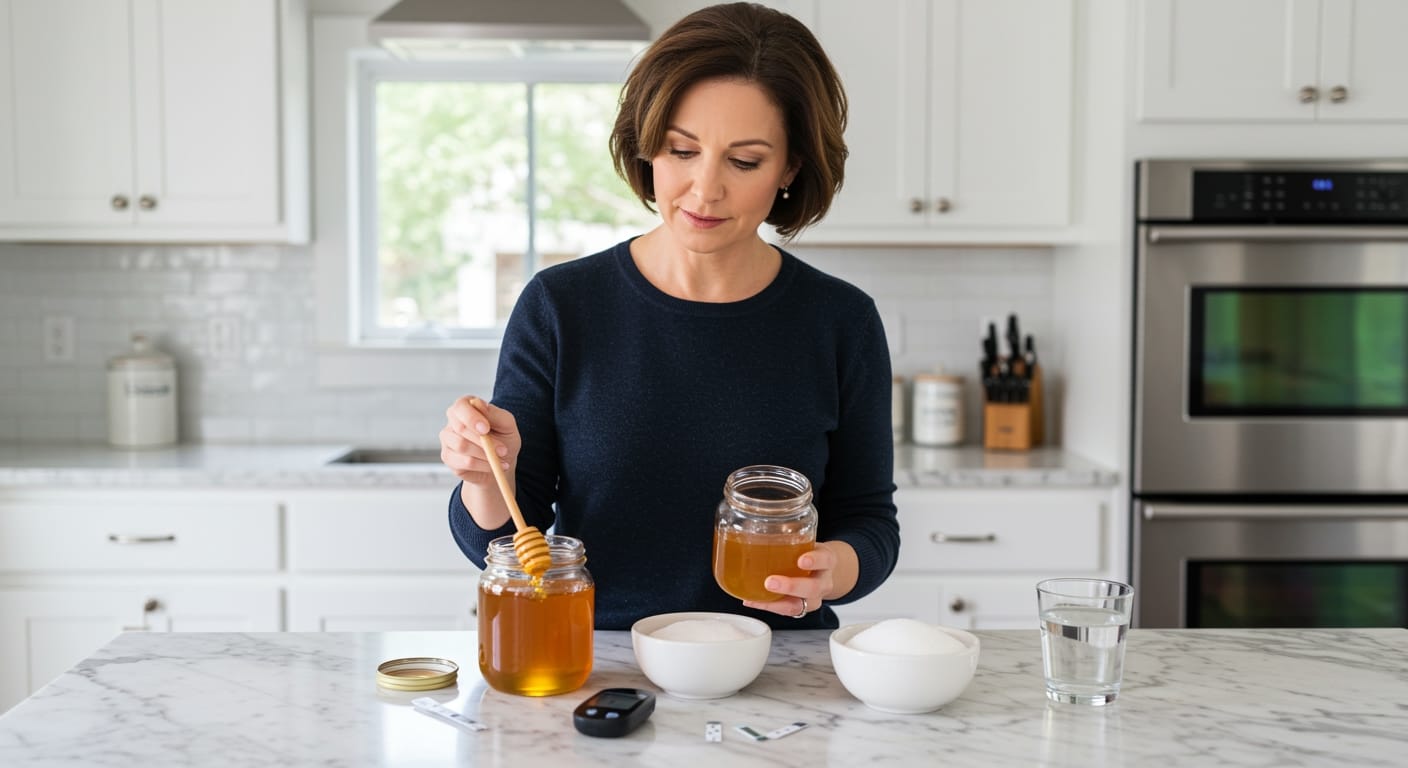✪ Key Takeaway: Honey raises blood sugar almost as much as regular sugar, making it unsuitable as a diabetes-friendly sweetener replacement.
Introduction
Your doctor just told you to cut sugar from your diet because of diabetes.
You might be wondering if honey could be your sweet salvation since it comes from nature and seems healthier than processed white sugar.
Hi, I’m Abdur, your nutrition coach and today I’m going to explain whether diabetics can safely eat honey instead of regular sugar and what this choice means for your blood glucose control.
Does Honey Actually Raise Blood Sugar Less Than Regular Sugar?
The truth about honey and blood sugar will shock you.
Honey has a glycemic index of 61, while table sugar sits at 65.
This tiny difference means honey raises your blood sugar almost as quickly as regular sugar does.
Your body processes honey into glucose within minutes of eating it.
The fructose content in honey might seem like an advantage since fructose has a lower glycemic index.
However, honey contains about 38% fructose and 31% glucose, which means you still get a significant blood sugar spike from the glucose portion.
Research shows that people with diabetes experience similar blood glucose responses to honey and table sugar when consumed in equal amounts.
✪ Fact: One tablespoon of honey contains 17 grams of carbohydrates, nearly the same as table sugar at 16 grams.
What Makes Honey Different From Regular Sugar?
Honey does contain some nutrients that white sugar lacks completely.
Raw honey provides tiny amounts of antioxidants, enzymes, and minerals like potassium and magnesium.
These nutrients might offer some health benefits, but the amounts are so small they become meaningless when you consider portion sizes.
You would need to eat massive amounts of honey to get any significant nutritional benefit.
The processing difference between honey and sugar also matters less than people think.
While honey comes straight from bees and sugar goes through industrial processing, your digestive system treats both as simple carbohydrates.
Your pancreas must produce insulin to handle the glucose from both sweeteners, creating the same metabolic stress for diabetics.
✪ Pro Tip: Focus on total carbohydrate content rather than the source when managing diabetes.
How Much Honey Can Diabetics Safely Eat?
The American Diabetes Association recommends limiting all added sugars, including honey.
If you choose to eat honey occasionally, portion control becomes critical for blood sugar management.
One teaspoon of honey contains about 6 grams of carbohydrates, which you must count toward your daily carb allowance.
Most diabetes educators suggest treating honey exactly like any other sugar in your meal planning.
The key is timing and pairing honey with protein or fiber to slow absorption.
Never eat honey on an empty stomach as this causes the fastest blood sugar spike possible.
Your best strategy involves testing your blood glucose before and after eating honey to understand your personal response pattern.
✪ Note: Always consult your healthcare provider before making changes to your diabetes management plan.
What Are Better Sweetener Options For Diabetics?
Several sweetener alternatives work better for diabetes management than honey.
Stevia provides sweetness without affecting blood glucose levels at all.
This natural sweetener comes from the stevia plant and has zero calories and zero carbohydrates.
Monk fruit sweetener offers another excellent option with no impact on blood sugar.
Sugar alcohols like erythritol and xylitol provide sweetness with minimal blood glucose impact.
These alternatives let you enjoy sweet flavors without the metabolic stress that honey creates.
The goal should be gradually reducing your overall sweet taste preference rather than finding perfect sugar substitutes.
✪ Pro Tip: Start with small amounts of alternative sweeteners to avoid digestive upset while your body adjusts.
The Bottom Line
Honey is not a safe sugar substitute for diabetics because it raises blood glucose almost as much as regular table sugar.
Sweet solutions require smart choices, not natural assumptions.
I would love to hear about your experiences with different sweeteners and how they affect your blood sugar levels, so please share your thoughts in the comments below.
References
At NutritionCrown, we use quality and credible sources to ensure our content is accurate and trustworthy. Below are the sources referenced in creating this article:





